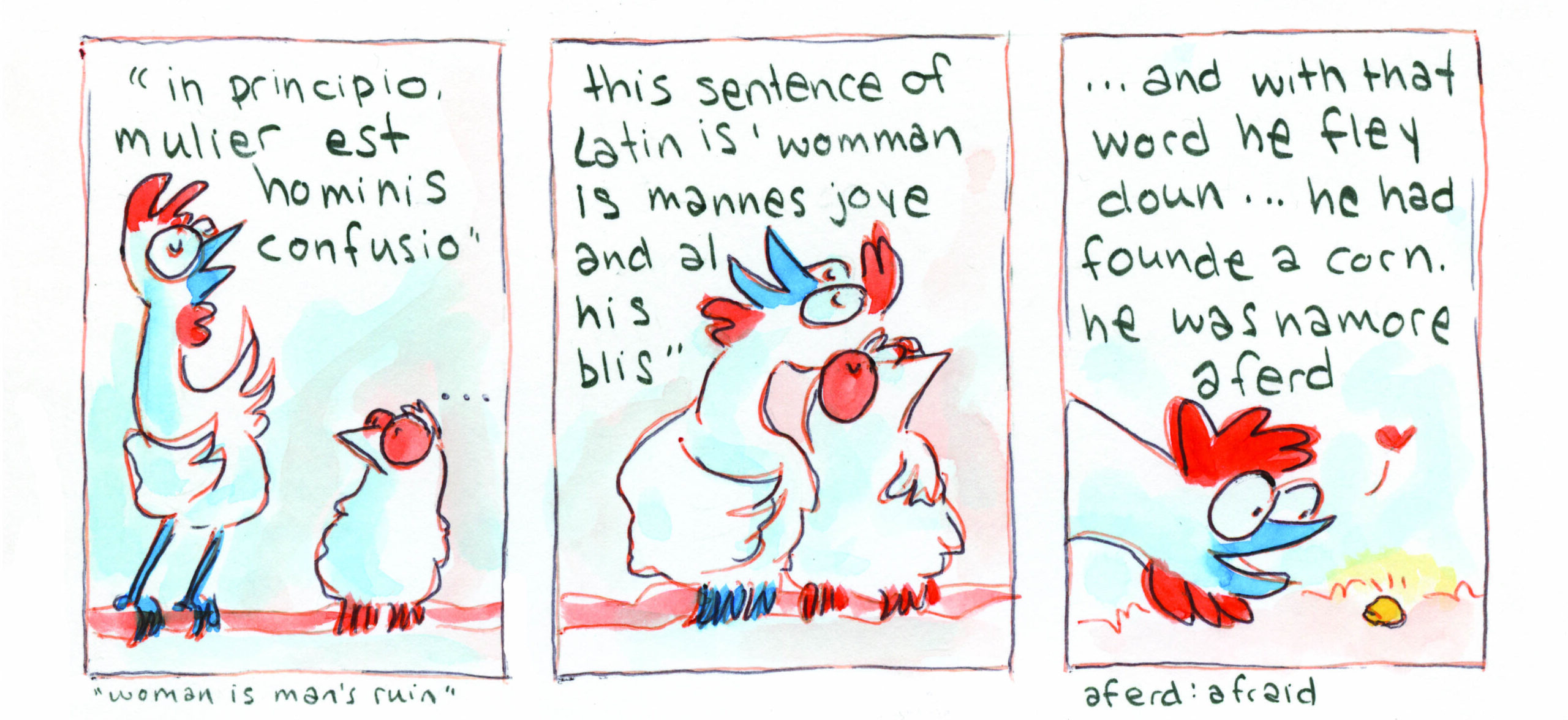Here at Good Comics, we’re thrilled to have another comic of Kristen Haas Curtis’s in our store.
Distributing her work in the UK is easy for us. It’s so pure, lighthearted and funny, most people can’t resist. Whether it’s when picking up Princess Wolf (co-written with her daughter Bea), or her short silent comic Crushing, we’re big fans.
This makes it even more of a delight to have her adaptation of Chaucer’s The Nun’s Priest’s Tale now available in our store! Kristen’s also written our latest guest blog about her work on Chaucer, below.
Enjoy!
I will never forget my first experience reading the medieval English poet, Geoffrey Chaucer.

If you’ve had this experience, you’re not alone! It took me about five weeks to warm up to him, but by the end of the semester, I was hooked.
Fast forward six years, and I’m now in the final year of my doctorate focusing on Chaucer’s work and the many adaptations and modernizations it has inspired. If you’re not (yet) familiar with Chaucer’s work, his writing displays a remarkable versatility, ranging from the tragedies of first love to talking birds to extended fart jokes, with a little bit of hagiography thrown in, too.
He’s smart and funny; he’s a keen observer with a knack for capturing personalities and situations in a way that still resonates today… that’s if you can make your way around the Middle English.

Hmmmm.
As a reader, you have a couple of options: either you read it in modern translation or you use a text that includes extensive glossing to help you with the language. Most students end up working with the latter, as I did (and do) because the language really is fun once you get used to it.
However, the glossed text brings a problem of its own: bouncing back and forth across the page from text to gloss and back again can make it difficult to follow the story unfolding
Hmmmm.
As I spent more time with Chaucer and began to think about adaptations and how they work, I started wondering if a story from Chaucer told in comic form might be able to provide a more inviting experience for new readers by using visual cues to aid in comprehension of the Middle English. Could the combination of words and images for which comics are known actually function as a new kind of glossing on a very old text?
This question became the core of my Masters thesis in 2020.
I decided to work with one of the stories from Chaucer’s famous Canterbury Tales, a long poem written in the late 14th century that follows a group of people going on pilgrimage who engage in a storytelling contest to pass the time as they travel (best story gets a free dinner)! I settled on abridging “The Nun’s Priest’s Tale” as my text and I retained Chaucer’s Middle English in order to test my idea. I read, reread, planned, drew, and lettered and then I enlisted a couple of non-medievalist friends to read the nearly-finished comic for me and offer feedback. A couple more changes and it was off to print!
Since then, my little chicken comic has been taught in classrooms, included in university reading lists, distributed and discussed at academic conferences, and a copy is currently on display at the Bodleian Library as part of the incredible “Chaucer Here and Now” exhibition.
And now? My chickens have come to roost with the fantastic Good Comics team. I hope you enjoy it!

(Do you want to know more about Chaucer, adaptation, or chickens? In that case, you might enjoy this chat I had with Dan Berry last year on his podcast “Make It Then Tell Everybody.” Caution: contains John Dryden.)
Thanks Kristen!



